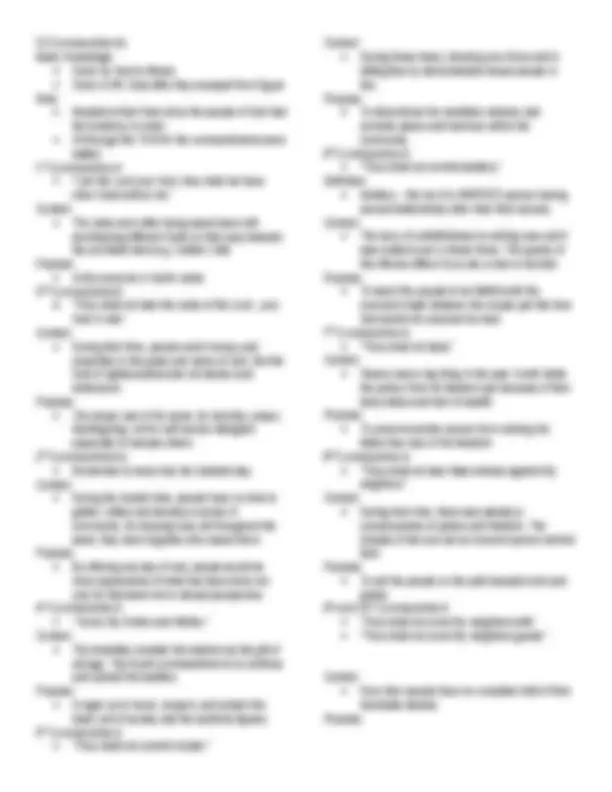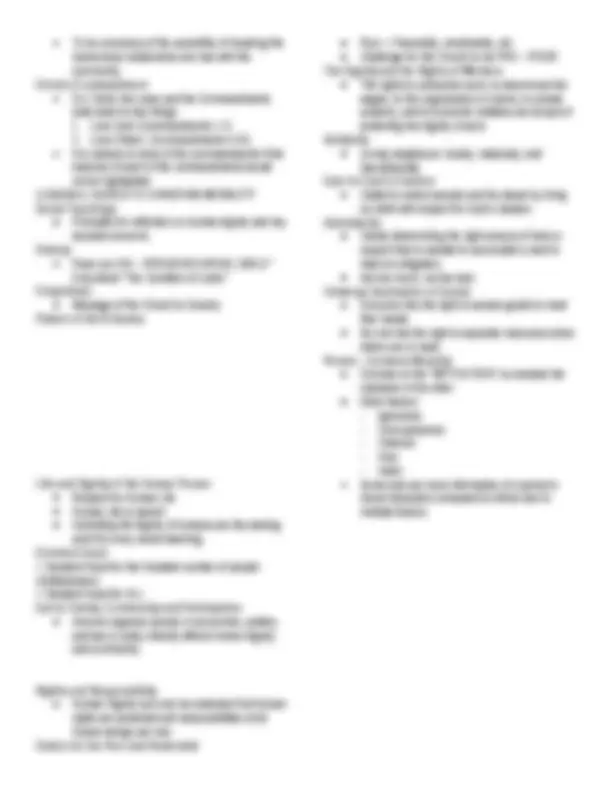




Study with the several resources on Docsity

Earn points by helping other students or get them with a premium plan


Prepare for your exams
Study with the several resources on Docsity

Earn points to download
Earn points by helping other students or get them with a premium plan
Community
Ask the community for help and clear up your study doubts
Discover the best universities in your country according to Docsity users
Free resources
Download our free guides on studying techniques, anxiety management strategies, and thesis advice from Docsity tutors
Lesson 1 to 5 Reviewer for CFE102
Typology: Lecture notes
1 / 4

This page cannot be seen from the preview
Don't miss anything!



Etymology (Latin) Moralis = “pertaining to manners” Definition The rightness or wrongness of an action in relation to a standard or norm of conduct. MORALITY vs. ETHICS Morality Individual principle of what is right or wrong (intrinsic). Ethics Codes of conduct set by an eternal source (extrinsic). Christian Morality Principles followed by the believers which are deeply rooted on the teachings of the ( commandments, Jesus’ life, etc.) Importance and Concepts Human Dignity DIGNITY (Latin dignitas, “worthiness”) The view that all human life has an intrinsic value. Intrinsic Innate to everyone unbounded by status, race, achievement, age, and etc. Inalienable No one has the right to take it away. Freedom The state of not being subjected to or affected by anything seen as oppressive or restrictive. However, “AUTHENTHIC” freedom entails responsibility and prudence. Conscience An inner feeling or voice viewed as acting as a guide to the rightness or wrongness of one’s behavior. “LET YOUR CONSCIENCE BE YOUR GUIDE”
- Faulty since not all conscience are clear. There is a need for a mature moral conscience because it moves people to make up one’s mind for ONESELF about what OUGHT to be done. Conscience is the whole person’s commitment to values, and the judgement he or she must make, in the light of that commitment to apply those values. LESSON 2: WHAT MAKES MORALITY? How do we judge? Rashly label everything Consider all factors possible Steps Step 1: determine if its an object of Morality Step 2: consider the Constituents of the Action Step 3: weigh – in the Elements of determining morality OBJECTS OF MORALITY Human acts these are actions that are proper to humans, thus the crucial elements of WILLFUL CONSENT an KNOWLEDGE must be present. Acts of Man these are actions not reflective of the person as a rational being. The action done is performed without conscious deliberation, knowledge and with the absence of freewill. CONSTITUENTS of HUMAN ACTS Known and deliberate There is prior knowledge of the consequences and there was a deliberate evaluation whether to fulfil an action or not. Free Free from any external factors in doing a certain action. Not forced. Not intimidated. Voluntary There is the presence of willingness of an individual to perform action. ELEMENTS in determining MORALITY The object/Act The human action itself. “WHAT” The circumstances Refers to the persons involved, the time, place, and occasion that surround an object/act. WHO, WHEN, WHERE, HOW The intention The purpose or the reason behind the act WHY LESSON 3: HOW TO BE CONSISTENTLY MORAL? Consistent Acting or done in the same way over time. Things done consistently will develop into a “HABIT”. Habit Behaviours done out of repetition over the course of our life. It is learned from the environment we are exposed to. THE DIFFERENCE of VIRTUES and VICES Virtues Behaviours showing high moral standards
Types of Virtues
1. Cardinal Virtues – the central or pivotal aspect of behaviour which is the definition of high moral standards and values within a human being. Prudence Temperance Fortitude justice 2. Theological PRUDENCE The habit of practical reason which enables one to judge promptly on particular cases or actions on what is to be done or omitted. “RIGHT REASON APPLIED TO PRACTICE” Prudence Characteristics Practical Memory Understanding Docility Ingenuity Foresight Circumspection Caution FORTITUDE Enables one to endure pain, danger, and death with calmness of reason. Physical Strength = Will power Two Forms of Fortitude 1. Active Function 2. Passive Function JUSTICE Moderation between selfishness and selflessness. “GIVING WHAT IS DUE” Justice = Equality Justice = Equity TEMPERANCE Moderation in action, thought, or feeling; restraint. VICES Immoral or wicked behaviour BIBLICALLY CHARACTERIZED BT THE 7 DEADLY SINS LUST Disordered desire for or inordinate enjoyment for sexual pleasure. GLUTTONY Over indulgence of a person in consuming food more than what is required. GREED Desire to possess excessive wealth, material goods or anything of value.
Avoidance of physical or spiritual work. ENVY Excessive desire to have a quality, possession, or other desirable attribute belonging to (someone else). WRATH Inordinate and uncontrolled feeling of hatred and danger. PRIDE Desire to be more important or attractive than others, failing to acknowledge their goodness. LESSON 4: MAN AS THE MORAL AGENT The Creation Story (Genesis 1:26-28) What can we draw from this passage?
To be conscious of the possibility of breaking the harmonious relationship one has with the community. Christ’s Commandment For Christ, the Laws and the Commandments boils down to two things: